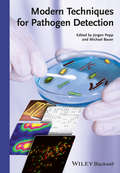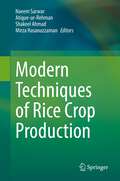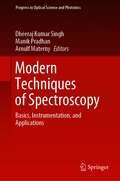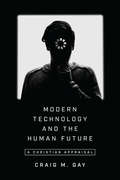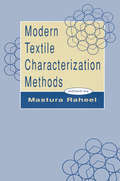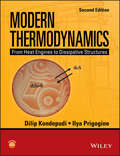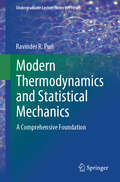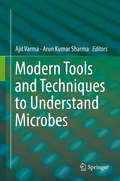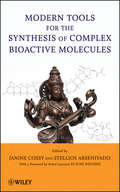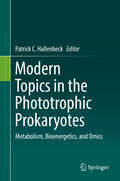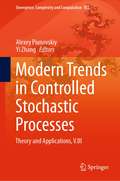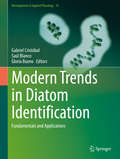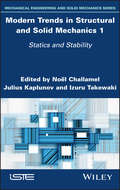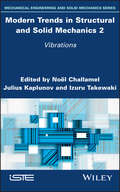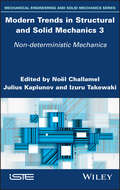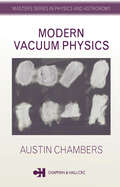- Table View
- List View
Modern Taxonomy of Bacteria and Archaea: New Methods, Technology and Advances
by Wen-Jun Li Jian-Yu Jiao Nimaichand Salam Manik Prabhu Narsing RaoThis book introduces the current approaches in prokaryotic taxonomy and streamlines the advanced techniques for use in prokaryotic systematics. While highlighting the key differences in the taxonomy of cultured and not-yet-cultured bacteria and archaea, it presents the genomic technology involved in microbial systematics that serves as comprehensive guidelines for isolating and identifying bacteria. Microbial systematics is a fundamentally important discipline area for microbiologists and those seeking to understand Earth’s biodiversity. As bacterial taxonomy is critical in microbial ecology and clinical microbiology works, the correct identification of microbes is crucial. However, the microbial collection existing and described as cultured species so far are either based on the taxonomic pattern that existed during its time of first cultivation. With evolving technology, many microbes were found to be wrongly classified. Therefore, it is essential to keep in contact withthe developing technology and methods for the correct placement of cultured bacteria and their identification. This book is an excellent guideline for adequately identifying, classifying, and describing novel taxa of bacteria and archaea.
Modern Techniques and Solvents for the Extraction of Microbial Oils
by Farid Chemat Alice Meullemiestre Cassandra Breil Maryline Abert-VianA valuable reference presenting many processes that facilitate lipid extraction from micro-organisms. Amongst the techniques included are Folch, Bligh and Dyer methods, and the Soxhlet technique as well as intensified green processes (ultrasound, microwave, supercritical fluid extraction, agro-solvent, accelerated solvent extraction, enzyme-assisted extraction, instant controlled pressure drop, pulse electric field). In addition to a section featuring the analysis of fatty acids by Gas Chromatography and lipids by High-Performance Thin-Layer Chromatography (HPTLC), this brief contains a valuable bibliography on microorganisms (classes, structures) and their applications as a source of value added oils and compounds for food and non-food applications such as biojet fuel.
Modern Techniques for Nano- and Microreactors/-reactions
by Frank Caruso-Encapsulation by Miniemulsion Polymerization By K. Landfester and C. K. Weiss -Enzyme-Encapsulated Layer-by-Layer Assemblies: Current Status and Challenges Toward Ultimate Nanodevices By K. Ariga, Q. Ji, and J. P. Hill -Non-LBL Assembly and Encapsulation Uses 1 of Nanoparticle-Shelled Hollow Spheres 2 By G.C. Kini, S. L. Biswal, and M. S. Wong -Polymersomes: A Synthetic Biological Approach to Encapsulation and Delivery By M. Massignani, H. Lomas, and G. Battaglia -Reaction Vessels Assembled by the Sequential Adsorption of Polymers By A.D. Price, A.P.R. Johnston, G.K. Such, and F. Caruso
Modern Techniques for Pathogen Detection
by Jürgen Popp Michael BauerThis outstanding overview sets a new standard for a methods book on pathogen detection. The first chapter provides an outline of currently used routine methods, including their background, strengths and weaknesses, as well as comparing them to newer methods. The following chapters then cover novel methods already in wide use and which are still more experimental for routine purposes. An invaluable resource for all medical laboratories and clinical institutions dealing with infectious diseases.
Modern Techniques in Bridge Engineering: Proceedings of 6th New York City Bridge Conference, 25-26 July 2011
by Khaled M. MahmoudDue to significant economic growth in the last few decades, increasing traffic loads impose tremendous demand on bridge structures. This, coupled with ongoing deterioration of bridges, introduces a unique challenge to bridge engineers in maintaining service of these infrastructure assets without disruption to vital economic and social act
Modern Techniques of Rice Crop Production
by Mirza Hasanuzzaman Shakeel Ahmad Naeem Sarwar Atique-Ur-RehmanThis book collects all the latest technologies with their implications on the global rice cultivation. It discusses all aspects of rice production and puts together the latest trends and best practices in the rice production. Rice is produced and consumed worldwide and especially an important crop for Asia. It is a staple food in majority of population living is this continent which distinguishes this from rest of the world. Climatic fluctuations, elevated concentrations of carbon dioxide, enhanced temperature have created extreme weather conditions for rice cultivation. Also, increasing pest attacks make situation complicated for the farmers. Therefore, rice production technology also has to be adjusted accordingly. This book is of interest to teachers, researchers, plant biotechnologists, pathologists, agronomists, soil scientists, food technologists from different part of the globe. Also, the book serves as additional reading material for students of agriculture, soil science, and environmental sciences. National and international agricultural scientists, policy makers will also find this to be a useful read
Modern Techniques of Spectroscopy: Basics, Instrumentation, and Applications (Progress in Optical Science and Photonics #13)
by Dheeraj Kumar Singh Arnulf Materny Manik PradhanThe book highlights recent developments in the field of spectroscopy by providing the readers with an updated and high-level of overview. The focus of this book is on the introduction to concepts of modern spectroscopic techniques, recent technological innovations in this field, and current examples of applications to molecules and materials relevant for academia and industry. The book will be beneficial to researchers from various branches of science and technology, and is intended to point them to modern techniques, which might be useful for their specific problems. Spectroscopic techniques, that are discussed include, UV-Visible absorption spectroscopy, XPS, Raman spectroscopy, SERS, TERS, CARS, IR absorption spectroscopy, SFG, LIBS, Quantum cascade laser (QCL) spectroscopy, fluorescence spectroscopy, ellipsometry, cavity-enhanced absorption spectroscopy, such as cavity ring-down spectroscopy (CRDS) and evanescent wave-CRDS both in gas and condensed phases, time-resolved spectroscopy etc. Applications introduced in the different chapters demonstrates the usefulness of the spectroscopic techniques for the characterization of fundamental properties of molecules, e.g. in connection with environmental impact, bio-activity, or usefulness for pharmaceutical drugs, and materials important e.g. for nano-science, nuclear chemistry, or bio-applications. The book presents how spectroscopic techniques can help to better understand substances, which have also great impact on questions of social and economic relevance (environment, alternative energy, etc.).
Modern Techniques of Surface Science
by D. Phil WoodruffThis is a fully revised and expanded edition of a very successful and widely used book. It describes the physical basis of all the principal, and most of the more specialised, techniques currently employed in the study of well-characterised solid surfaces. The coverage of each technique, illustrated with selected examples, is underpinned by discussion of the relevant physical principles, and the complementary aspects of the various methods are also described. Throughout, the emphasis is on understanding the concepts involved, rather than on an exhaustive review of applications. The book will be of great use to final year undergraduate and postgraduate students in physics, chemistry and materials science. It will also be valuable to established researchers in any area of surface science concerned with the acquisition and analysis of experimental data.
Modern Technology and the Human Future: A Christian Appraisal
by Craig M. GayTechnology is not neutral.
Modern Textile Characterization Methods (International Fiber Science and Technology #13)
by Mastura RaheelThis work details current advances in assessing the characteristics of polymers, single fibres and fibrous systems, and associated processes based on evolving theories in the physical, chemical and mechanical sciences. It focuses on recent develpments in selected characterization methods - such as Fourier transform infrared spectroscopy, Fourier transform nuclear magnetic resonance, electron diffraction, x-ray diffraction and electron microscopy - applicatble to polymers, fibres and textiles.
Modern Theories of Many-Particle Systems in Condensed Matter Physics
by Daniel C. Cabra Andreas Honecker Pierre PujolCondensed matter systems where interactions are strong are inherently difficult to analyze theoretically. The situation is particularly interesting in low-dimensional systems, where quantum fluctuations play a crucial role. Here, the development of non-perturbative methods and the study of integrable field theory have facilitated the understanding of the behavior of many quasi one- and two-dimensional strongly correlated systems. In view of the same rapid development that has taken place for both experimental and numerical techniques, as well as the emergence of novel testing-grounds such as cold atoms or graphene, the current understanding of strongly correlated condensed matter systems differs quite considerably from standard textbook presentations. The present volume of lecture notes aims to fill this gap in the literature by providing a collection of authoritative tutorial reviews, covering such topics as quantum phase transitions of antiferromagnets and cuprate-based high-temperature superconductors, electronic liquid crystal phases, graphene physics, dynamical mean field theory applied to strongly correlated systems, transport through quantum dots, quantum information perspectives on many-body physics, frustrated magnetism, statistical mechanics of classical and quantum computational complexity, and integrable methods in statistical field theory. As both graduate-level text and authoritative reference on this topic, this book will benefit newcomers and more experienced researchers in this field alike.
Modern Theory of Magnetism in Metals and Alloys
by Yoshiro KakehashiThis book describes theoretical aspects of the metallic magnetism from metals to disordered alloys to amorphous alloys both at the ground state and at finite temperatures. The book gives an introduction to the metallic magnetism, and treats effects of electron correlations on magnetism, spin fluctuations in metallic magnetism, formation of complex magnetic structures, a variety of magnetism due to configurational disorder in alloys as well as a new magnetism caused by the structural disorder in amorphous alloys, especially the itinerant-electron spin glasses. The readers will find that all these topics can be understood systematically by means of the spin-fluctuation theories based on the functional integral method.
Modern Thermodynamics
by Dilip Kondepudi Ilya PrigogineModern Thermodynamics: From Heat Engines to Dissipative Structures, Second Edition presents a comprehensive introduction to 20th century thermodynamics that can be applied to both equilibrium and non-equilibrium systems, unifying what was traditionally divided into 'thermodynamics' and 'kinetics' into one theory of irreversible processes.This comprehensive text, suitable for introductory as well as advanced courses on thermodynamics, has been widely used by chemists, physicists, engineers and geologists. Fully revised and expanded, this new edition includes the following updates and features:* Includes a completely new chapter on Principles of Statistical Thermodynamics.* Presents new material on solar and wind energy flows and energy flows of interest to engineering. * Covers new material on self-organization in non-equilibrium systems and the thermodynamics of small systems.* Highlights a wide range of applications relevant to students across physical sciences and engineering courses.* Introduces students to computational methods using updated Mathematica codes. * Includes problem sets to help the reader understand and apply the principles introduced throughout the text.* Solutions to exercises and supplementary lecture material provided online at http://sites.google.com/site/modernthermodynamics/.Modern Thermodynamics: From Heat Engines to Dissipative Structures, Second Edition is an essential resource for undergraduate and graduate students taking a course in thermodynamics.
Modern Thermodynamics and Statistical Mechanics: A Comprehensive Foundation (Undergraduate Lecture Notes in Physics)
by Ravinder R. PuriThis undergraduate-level textbook offers a unique and in-depth approach to the study of thermodynamics and statistical mechanics. It covers the fundamentals of thermodynamics using both traditional and postulatory approaches, including origin of the concept of thermodynamic entropy, Euler’s equation, Gibbs-Duhem relations, stability of equilibrium, and the concept of thermodynamic potentials, and that of independent thermodynamic observables. The book then delves into the microscopic foundation of thermodynamics, starting with the kinetic theory and highlighting its historical development. Boltzmann's concept of entropy is explored, along with its applications in deriving Planck’s, Bose’s, Bose-Einstein, and Fermi-Dirac distribution functions. The formal structure of classical and quantum statistical mechanics is built based on the concept of statistical entropy and the maximum entropy principle and used to investigate in detail the thermodynamic properties of ideal classical and quantum systems. The book also covers phase transitions, simple theory of critical phenomena, and the theory of interacting van der Waals gases. Throughout the text, the book provides historical context, enriching the reader's understanding. This textbook is a valuable resource for undergraduate physics students, offering comprehensive coverage, including overlooked topics, and a historical perspective on thermodynamics and statistical mechanics.
Modern Tools and Techniques to Understand Microbes
by Ajit Varma Arun Kumar SharmaThis book provides essential molecular techniques and protocols for analyzing microbes that are useful for developing novel bio-chemicals, such as medicines, biofuels, and plant protection substances. The topics and techniques covered include: microbial diversity and composition; microorganisms in the food industry; mass cultivation of sebacinales; host-microbe interaction; targeted gene disruption; function-based metagenomics to reveal the rhizosphere microbiome; mycotoxin biosynthetic pathways; legume-rhizobium symbioses; multidrug transporters of yeast; drug-resistant bacteria; the fungal endophyte piriformospora indica; medicinal plants; arbuscular mycorrhizal fungi; biosurfactants in microbial enhanced oil recovery; and biocontrol of the soybean cyst nematode with root endophytic fungi; as well as microbe-mediated drought tolerance in plants.
Modern Tools for the Synthesis of Complex Bioactive Molecules
by Stellios Arseniyadis Janine CossyAll the latest tools needed to plan and perform the synthesis of complex bioactive moleculesFocusing on organic, organometallic, and bio-oriented processes, this book explores the impact and use of the latest synthetic tools for the synthesis of complex biologically active compounds. Readers will discover step by step how these synthetic tools have provided new, elegant solutions to many synthetic puzzles. Moreover, they will discover innovative methods that make it possible to control the exact connectivity of atoms within a molecule in order to set precise three-dimensional arrangements.Modern Tools for the Synthesis of Complex Bioactive Molecules features sixteen chapters, each one written by one or more leading experts in organic synthesis from around the world. It covers a broad range of topics that enable readers to take advantage of the latest methods for synthesizing complex molecules, including:Modern catalysis, emphasizing key transformations such as C-H functionalizations, cross-couplings, gold-catalyzed reactions, metathesis-based syntheses, and asymmetric organocatalysisEco-compatible transformations, including rearrangements and domino reactionsTools for the synthesis of carbohydrates and alkaloidsNew techniques, including the use of fluorous tags and engineered biosynthesisThe last two chapters explore target- and diversity-oriented organic synthesis as well as the use of DNA-based asymmetric catalysis, which are all promising tools for the successful synthesis of complex bioactive molecules.Modern Tools for the Synthesis of Complex Bioactive Molecules is ideal for students and researchers who need to plan and perform the synthesis of complex molecules as efficiently as possible. The book's expert advice will help these readers quickly resolve a broad range of problems that can arise in organic syntheses.
Modern Tools of Biophysics
by Thomas JueHandbook of Modern Biophysics brings current biophysics topics into focus, so that biology, medical, engineering, mathematics, and physical-science students or researchers can learn fun#65533;damental concepts and the application of new techniques in addressing biomedical challenges. Chapters will develop the conceptual framework of the physics formalism and illustrate the biomedical applica#65533;tions. With the addition of problem sets, guides to further study, and references, the interested reader can continue to independently explore the ideas presented. Volume 5: Modern Tools of Biophysics Editor: Thomas Jue, PhD In Modern Tools of Biophysics, a group of prominent professors have provided insights into the tools used in biophysics with respect to the following topics: Wave Theory of Image Formation in a Microscope: Basic Theory and Experiments Computer Simulations and Nonlinear Dynamics of Cardiac Action Potentials Myoglobin and Hemoglobin Contribution to the NIRS Signal in Muscle Anomalous Low Angle X-Ray Scattering of Membrane with Lanthanides Recording of Ionic Currents under Physiological Conditions--Action Potential-Clamping and "Onion-Peeling" Techniques Patch Clamp Technique and Applications About the Editor Thomas Jue is a Professor in the Department of Biochemistry and Molecular Medicine at the University of California, Davis. He is an internationally recognized expert in developing and applying magnetic resonance techniques to study animal as well as human physiology in vivo and has published extensively in the field of magnetic resonance spectroscopy and imaging, near-infrared spectroscopy, bioenergetics, cardiovascular regulation, exercise, and marine biology. He served as a Chair of the Biophysics Graduate Group Program at UC Davis, where he started to develop scholarly approaches to educate graduate students with a balance of physical-science/mathematics formalism and biomedical perspective in order to promote interest at the interface of physical science, engineering, mathematics, biology, and medicine. He continues to develop the biophysics curriculum, and the Handbook of Modern Biophysics represents an aspect of that effort.
Modern Topics in the Phototrophic Prokaryotes
by Patrick C. HallenbeckThis book offers authoritative contributions by world experts actively working on different aspects of phototrophic prokaryotes. Providing up-to-date information in this rapidly advancing field, it covers the range of topics that are currently the focus of research with this group of organisms. As essentially single-celled organisms, phototrophic prokaryotes process many environmental signals and use this information to optimize their metabolism, growth rate, DNA replication and cell division. Phototrophic prokaryotes are collectively of great interest for a number of different fundamental and applied perspectives and have long served as models for understanding such basic fundamental biological processes as photosynthesis and respiration. On an ecological/environmental level they are extremely important, being the most abundant photosynthetic organisms on earth and responsible for the majority of the primary productivity in the oceans. They also hold great promise as biotechnological catalysts, being able to couple solar energy conversion through photosynthesis and carbon fixation to the production of biofuels, commodity chemicals and neutraceuticals. The book is recommended to advanced students and scientists dealing with life sciences, especially in genetics, microbiology and molecular biology.
Modern Topics in the Phototrophic Prokaryotes
by Patrick C. HallenbeckThis book offers authoritative contributions by world experts actively working on different aspects of phototrophic prokaryotes. Providing up-to-date information in this rapidly advancing field, it covers the range of topics that are currently the focus of research with this group of organisms. As essentially single-celled organisms, phototrophic prokaryotes process many environmental signals and use this information to optimize their metabolism, growth rate, DNA replication and cell division. Phototrophic prokaryotes are collectively of great interest for a number of different fundamental and applied perspectives and have long served as models for understanding such basic fundamental biological processes as photosynthesis and respiration. On an ecological/environmental level they are extremely important, being the most abundant photosynthetic organisms on earth and responsible for the majority of the primary productivity in the oceans. They also hold great promise as biotechnological catalysts, being able to couple solar energy conversion through photosynthesis and carbon fixation to the production of biofuels, commodity chemicals and neutraceuticals. The book is recommended to advanced students and scientists dealing with life sciences, especially in genetics, microbiology and molecular biology.
Modern Trends in Controlled Stochastic Processes: Theory and Applications, V.III (Emergence, Complexity and Computation #41)
by Yi Zhang Alexey PiunovskiyThis book presents state-of-the-art solution methods and applications of stochastic optimal control. It is a collection of extended papers discussed at the traditional Liverpool workshop on controlled stochastic processes with participants from both the east and the west. New problems are formulated, and progresses of ongoing research are reported. Topics covered in this book include theoretical results and numerical methods for Markov and semi-Markov decision processes, optimal stopping of Markov processes, stochastic games, problems with partial information, optimal filtering, robust control, Q-learning, and self-organizing algorithms. Real-life case studies and applications, e.g., queueing systems, forest management, control of water resources, marketing science, and healthcare, are presented. Scientific researchers and postgraduate students interested in stochastic optimal control,- as well as practitioners will find this book appealing and a valuable reference.
Modern Trends in Diatom Identification: Fundamentals and Applications (Developments in Applied Phycology #10)
by Gabriel Cristóbal Saúl Blanco Gloria BuenoHigh-resolution images of phytoplankton cells such as diatoms or desmids, which are useful for monitoring water quality, can now be provided by digital microscopes, facilitating the automated analysis and identification of specimens. Conventional approaches are based on optical microscopy; however, manual image analysis is impractical due to the huge diversity of this group of microalgae and its great morphological plasticity. As such, there is a need for automated recognition techniques for diagnostic tools (e.g. environmental monitoring networks, early warning systems) to improve the management of water resources and decision-making processes. Describing the entire workflow of a bioindicator system, from capture, analysis and identification to the determination of quality indices, this book provides insights into the current state-of-the-art in automatic identification systems in microscopy.
Modern Trends in Structural and Solid Mechanics 1: Statics and Stability
by Izuru Takewaki Noël Challamel Julius KaplunovThis book - comprised of three separate volumes - presents the recent developments and research discoveries in structural and solid mechanics; it is dedicated to Professor Isaac Elishakoff. This first volume is devoted to the statics and stability of solid and structural members. Modern Trends in Structural and Solid Mechanics 1 has broad scope, covering topics such as: buckling of discrete systems (elastic chains, lattices with short and long range interactions, and discrete arches), buckling of continuous structural elements including beams, arches and plates, static investigation of composite plates, exact solutions of plate problems, elastic and inelastic buckling, dynamic buckling under impulsive loading, buckling and post-buckling investigations, buckling of conservative and non-conservative systems and buckling of micro and macro-systems. This book is intended for graduate students and researchers in the field of theoretical and applied mechanics.
Modern Trends in Structural and Solid Mechanics 2: Vibrations
by Izuru Takewaki Noël Challamel Julius KaplunovThis book – comprised of three separate volumes – presents the recent developments and research discoveries in structural and solid mechanics; it is dedicated to Professor Isaac Elishakoff. This second volume is devoted to the vibrations of solid and structural members. Modern Trends in Structural and Solid Mechanics 2 has broad scope, covering topics such as: exact and approximate vibration solutions of rods, beams, membranes, plates and three-dimensional elasticity problems, Bolotin's dynamic edge effect, the principles of plate theories in dynamics, nano- and microbeams, nonlinear dynamics of shear extensible beams, the vibration and aeroelastic stability behavior of cellular beams, the dynamic response of elastoplastic softening oscillators, the complex dynamics of hysteretic oscillators, bridging waves, and the three-dimensional propagation of waves. This book is intended for graduate students and researchers in the field of theoretical and applied mechanics.
Modern Trends in Structural and Solid Mechanics 3: Non-deterministic Mechanics
by Izuru Takewaki Noël Challamel Julius KaplunovThis book – comprised of three separate volumes – presents the recent developments and research discoveries in structural and solid mechanics; it is dedicated to Professor Isaac Elishakoff. This third volume is devoted to non-deterministic mechanics. Modern Trends in Structural and Solid Mechanics 3 has broad scope, covering topics such: design optimization under uncertainty, interval field approaches, convex analysis, quantum inspired topology optimization and stochastic dynamics. The book is illustrated by many applications in the field of aerospace engineering, mechanical engineering, civil engineering, biomedical engineering and automotive engineering. This book is intended for graduate students and researchers in the field of theoretical and applied mechanics.
Modern Vacuum Physics
by Austin ChambersModern Vacuum Physics presents the principles and practices of vacuum science and technology along with a number of applications in research and industrial production. The first half of the book builds a foundation in gases and vapors under rarefied conditions, The second half presents examples of the analysis of representative systems and describe



